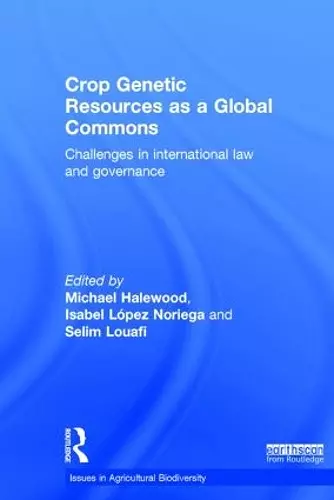Crop Genetic Resources as a Global Commons
Challenges in International Law and Governance
Michael Halewood editor Isabel Lopez Noriega editor Selim Louafi editor
Format:Hardback
Publisher:Taylor & Francis Ltd
Published:12th Nov '12
Currently unavailable, our supplier has not provided us a restock date
This hardback is available in another edition too:
- Paperback£63.99(9781844078936)

Farmers have engaged in collective systems of conservation and innovation – improving crops and sharing their reproductive materials – since the earliest plant domestications. Relatively open flows of plant germplasm attended the early spread of agriculture; they continued in the wake of (and were driven by) imperialism, colonization, emigration, trade, development assistance and climate change. As crops have moved around the world, and agricultural innovation and production systems have expanded, so too has the scope and coverage of pools of shared plant genetic resources that support those systems. The range of actors involved in their conservation and use has also increased dramatically.
This book addresses how the collective pooling and management of shared plant genetic resources for food and agriculture can be supported through laws regulating access to genetic resources and the sharing of benefits arising from their use. Since the most important recent development in the field has been the creation of the multilateral system of access and benefit-sharing under the International Treaty on Plant Genetic Resources for Food and Agriculture, many of the chapters in this book will focus on the architecture and functioning of that system. The book analyzes tensions that are threatening to undermine the potential of access and benefit-sharing laws to support the collective pooling of plant genetic resources, and identifies opportunities to address those tensions in ways that could increase the scope, utility and sustainability of the global crop commons.
"A rigorous, in-depth analysis of successful commons governance on a global scale has long been an under-researched, often overlooked and poorly understood area of study. Yet the critical importance collaborative management of global resources requires urgent attention. In this groundbreaking volume, Halewood, Noriega, and Louafi have assembled an international group of leading scholars and practitioners to systematically guide us through the complex terrain of crop genetic resources and agricultural biodiversity as global commons. The thoroughness of the analysis along with the lessons learned from practical applications will serve as indispensable tools for students of all types of global-commons resources." – Charlotte Hess, co-editor with Elinor Ostrom of 'Understanding Knowledge as a Commons' and Associate Dean for Research, Collections, and Scholarly Communication for Syracuse University Library
"The preservation and enhancement of agrobiodiversity is of huge importance in a world that shall witness more disruptive climate shocks in the future, and in which food-deficit regions shall be increasingly dependent on food-surplus regions. This volume makes a strong case for governing plant genetic resources in ways that promote the evolution and conservation of agrobiodiversity, and to ensure that they are available to be used by all regions to adapt better to a changing environment. Yet, it is more than just another book about the governance of natural resources by the best experts in the field: it is also an indispensable tool to understand the future of agriculture in a world of dwindling resources and biodiversity loss." – Olivier de Schutter, United Nations Special Rapporteur on the Right to Food
"These meticulous studies of the FAO Treaty are of major theoretical and empirical importance to scholars and practitioners seeking a workable, transnational regime to govern all genetic resources for research and benefit sharing under the evolving international legal framework." – Jerome H. Reichman, Bunyan S. Womble Professor of Law, Duke Law School, USA
"The chapters in this book are meticulously researched and referenced. They provide some thought provoking suggestions for those concerned with agricultural research and policy formulation."– Michael Blakeney in Bio-Science Law Review
ISBN: 9781844078929
Dimensions: unknown
Weight: 930g
418 pages